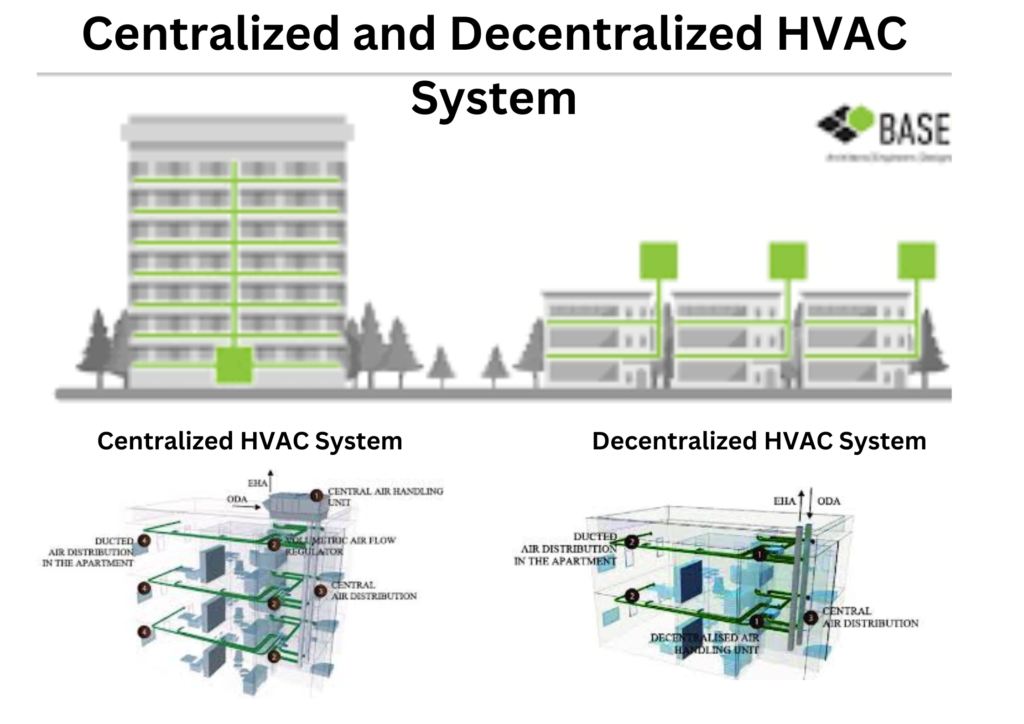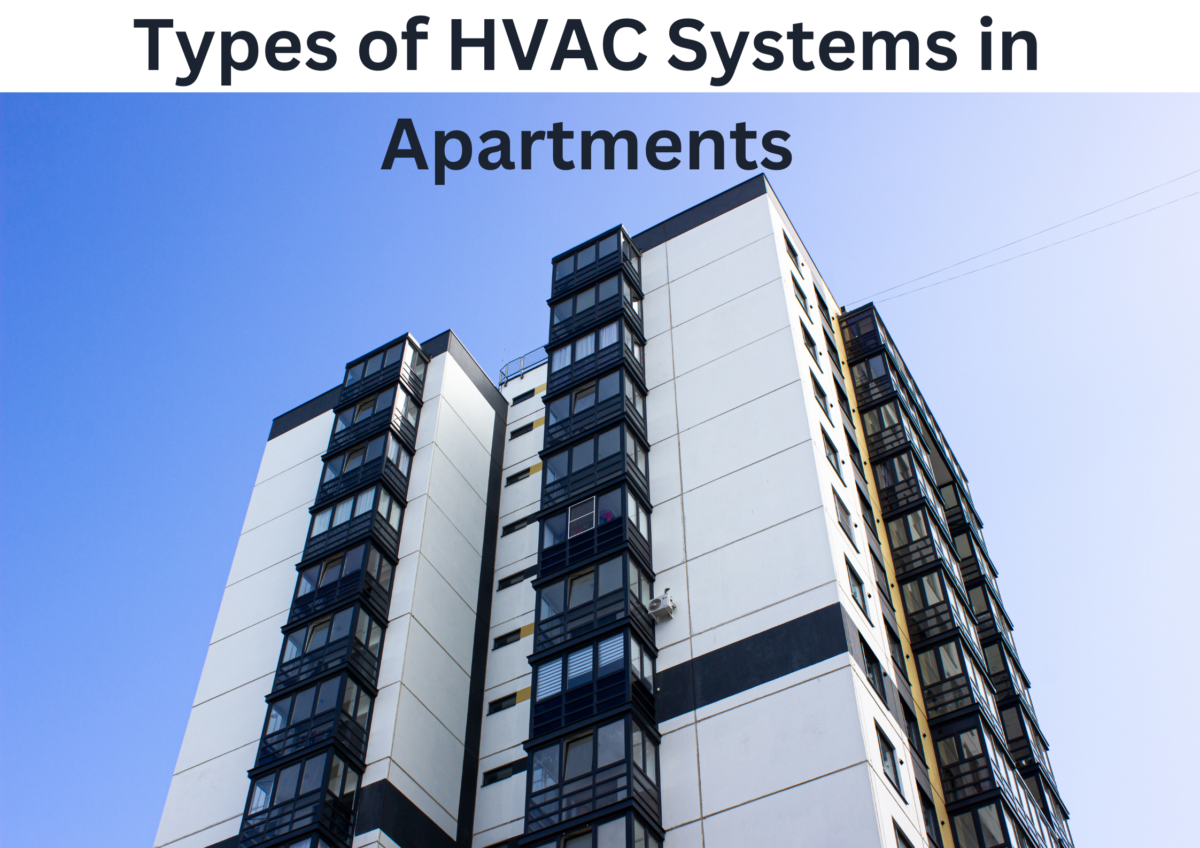Do you live in an apartment? If yes, then you must know the importance of an HVAC system that provides you with a comfortable environment in which to live. If you are an apartment owner then you must know how an efficient HVAC system reduces energy bills and provides optimal temperature and air quality. This also helps in increasing your property value.
This article explains the implementation of two major types of HVAC systems in apartments. It also describes 6 important factors that you should consider before buying an HVAC system for your apartment.
Read the full article a get a clear idea of the major types of HVAC systems used in apartments.
What Is an HVAC System?
HVAC stands for Heating, Ventilation, and Air Conditioning. It is an integrated system consisting of various heating, and cooling units like a heat pump, air conditioning system, furnace, boiler, air handler, thermostat, etc. It also includes mechanical ventilation and a filtration unit to improve the indoor air quality. All this equipment allows users to regulate the temperature and humidity inside the home.
The basic working principle of an HVAC system is it draws in the indoor air processes it through various units and circulates the conditioned air throughout the home via the ductwork and vents. The HVAC system also includes air purifiers that capture airborne particles like dust, pollen, pet dander, bacteria, viruses, etc., and supplies clean and purified air inside the home.
Importance of HVAC System in Apartments
- The ductless HVAC systems used by multi-family apartments ensure that each home inside the apartment will be supplied with cooled and heated air based on the user’s requirements.
- The installation of HVAC systems in apartments is important for your health and well-being. The air purifier inside it filters out the pollutants and allergens from the air and supplies clean and purified air.
- A well-designed HVAC system is highly energy efficient. It helps in reducing the electricity bill.
- An HVAC system maintains the desired temperature and humidity, which creates a comfortable and healthy environment to live.
Types of HVAC Systems in Apartments

Centralized HVAC System
What Is Centralized HVAC System?
In a centralized HVAC system, the air is heated or cooled at a central location and then the conditioned air is circulated inside the apartment via ducting networks and fans.
These types of HVAC systems are used in big houses and apartments for heating or, cooling purposes. These systems maintain the desired temperature of large areas.
A centralized HVAC system provides the conditioned air uniformly to the whole apartment at once.
Working Principle of a Centralized HVAC System
- A centralized HVAC consists of two units, i.e., an indoor unit and an outdoor unit. The outdoor unit is placed outside the apartment or in the garden area of the apartment. Whereas, the indoor unit is placed inside the house i.e., in the basement area or house’s attic.
- To supply cool air throughout the apartment the centralized HVAC system uses a compressor, condenser, evaporator, and metering device. The refrigeration cycle continues to cool a large area.
- To supply hot air the centralized HVAC system uses a gas furnace which is placed in the indoor unit. The gas furnace burns the natural gas and generates smoke. The smoke is then passed over the heat exchanger.
When the indoor air flows over the heat exchanger, it becomes heated and the heated air makes our house warmer.
- The electrical components used by a centralized HVAC system are the transformer, compressor motor, capacitor, bower fan motor, condenser fan motor, draft inducer motor, etc. The transformer converts the line voltage of 120 Volts to a control voltage of 24 Volts. A motor converts electrical energy to mechanical energy and a capacitor stores electrical energy to help the compressor to start and run smoothly.
- The air grilles which are the outlets and inlets of the ducts and the thermostat control are present inside the room. The conditioned air circulated inside the apartment through this ductwork. The ductwork also consists of air purifiers that capture airborne pollutants, bacteria, viruses, etc. to circulate clean and purified air.
Advantages of Centralized HVAC System
- A centralized HVAC system circulates both heated and cooled air throughout a large space.
- Easy to repair as this system contains a single main system. The maintenance of a centralized HVAC system is easy.
- The air purifier present inside the ductwork provides clean and purified air free from dust and contaminants.
Disadvantages of Centralized HVAC System
- A centralized HVAC system consumes more energy and this leads to high electricity bills.
- The installation cost of these systems is very expensive.
- It does not allow customization of temperatures for individual apartment units.
Decentralized HVAC System
What Is Decentralized HVAC System?
The decentralized HVAC system refers to the separate HVAC units for each residence inside an apartment. This means each unit of an apartment receives separate heating and cooling.
This system supplies conditioned air to a single room or, a small space rather than an entire apartment. These systems do not contain any ductwork or pipes to supply the heated or, cooled air.
Working Principle of a Decentralized HVAC System
The decentralized HVAC system contains multiple individual units in various locations of the apartment. They provide heated, cooled, and purified air to each unit separately.
Advantages of Decentralized HVAC System
- The system is flexible and it delivers the desired temperature individually to each unit.
- A decentralized HVAC system has a lower upfront cost.
- The installation requires less space.
Disadvantages of Decentralized HVAC System
- As a decentralized HVAC system contains multiple compressors, the amount of maintenance work is also multiplied.
- This type of HVAC system consumes more energy and thus, it increases the electricity bills.
- The operational cost of a decentralized HVAC system is higher.
- It needs regular maintenance and it also has a shorter life span than other types of HVAC systems.
What Are the Factors to Consider While Purchasing HVAC systems for Apartments?
- BTU Load Calculation
The British Thermal Unit (BTU) Load measures the heating and cooling capacity needed to maintain the desired temperature and humidity inside the apartment. The calculation of BTU lad depends on the square foot size of the apartment, insulation, ceiling height, etc. Before purchasing an HVAC system for your apartment always calculate the BTU load of your apartment.
- Size and Layout of Your Apartment
You must measure the size of your apartment, the number of rooms, and the zones you want to heat or cool. You should also consider the type of insulation used in your buildings, and the number of windows, and doors to select the perfect HVAC system for your apartment.
- Energy Efficiency Ratings:
While purchasing an HVAC system always look for the energy efficiency and energy ratings of the system. The higher energy efficiency value denotes lower power consumption and this leads to lower electricity bills.
- Number of People in The Apartment:
First, count the number of people living in the apartment before buying an HVAC system for your apartment. The more the number of people more the apartment’s BTU load. An insufficient capacity leads to discomfort and inefficient operation.
- Ductwork System in The Apartment:
Always check if the apartment has an adequate ductwork system or not. If the ductwork system is inefficient, it leads to performance degradation.
- Budget
By an HVAC system according to your budget. As several types of HVAC systems are available in the market and each system has different features, select one according to your requirements and budget. A well-designed and efficient HVAC system helps you save a lot of energy bills in the long run.
Conclusion
The selection of an efficient HVAC system is crucial as it is directly related to the health and well-being of people living in the apartment. It maintains the desired temperature and humidity of the indoor air. It also provides purified air free from pollutants, allergens, viruses, and bacteria.
The two major types of HVAC systems used in apartments are the centralized HVAC system and the decentralized HVAC system. A centralized HVAC system circulates both heated and cooled air from a central location to all over the apartments via the ducting network. Its maintenance is easy since it contains a single main system. Whereas it consumes more energy and causes more energy bills.
The decentralized HVAC system contains separate HVAC units for each residence inside an apartment. This system is flexible and has a lower upfront cost. Due to the multiple compressors present inside the system, the amount of maintenance work is also multiplied.
So, each type of HVAC system has its advantages and disadvantages. Select the best one according to your budget, your apartment’s layout, the number of people living in your apartment, energy ratings, etc.
FAQS
- What are the types of HVAC systems in apartments?
The two main types of HVAC systems used in apartments are centralized HVAC systems and decentralized HVAC systems. In a centralized HVAC system, the air is heated or cooled at a central location and then the conditioned air is circulated inside the apartment via ducting networks and fans. The decentralized HVAC system refers to the separate HVAC units for each residence inside an apartment. This means each unit of an apartment receives separate heating and cooling.
2. What is the full form of VRV in HVAC?
The full form of VRV in an HVAC system is a Variable Refrigerant Volume. This term signifies how the HVAC system uses refrigerant.
Also Read
- HVAC System Working Principle
- HVAC System Vs Air Conditioning System: 6 Major Differences
- What Are the Most Common Types of HVAC Systems? 2024
- 6 Types of HVAC Systems for Homes 2024
- How Does a Refrigerator Work? A Step-by-Step Guide 2024
- 8 Reasons Why Refrigerator Not Cooling and Solutions
- Side By Side Vs French Door Refrigerator 2024
- Counter Depth Refrigerator vs. Standard Refrigerator: Which One Is Better?
- Where Should I Place My Air Purifier? 2024
- How Do You Know If You Need an Air Purifier? 2024
- HEPA Air Purifier: Definition, Types, Uses, Efficiency, Working Principle
- Whole House Air Purifier: Types, Pros, Cons, Working Principle 2024
- Air Purifier Advantages and Disadvantages
- How Do Air Purifiers Help? 6 Benefits
- Whole House Dehumidifier: Types, Working Principle, Pros, Cons 2024
- How Does a Commercial Dehumidifier Work? 2024
- How Does a Dehumidifier Work? Types, Uses, Benefits 2024
- 10 Tips for Buying a Dehumidifier
- Dehumidifier Vs Air Purifier 2024
- Dehumidifier vs. Air Conditioner 2024
- Cool Mist Humidifier: Types, Uses, Benefits, Working Principle 2024
- Do Humidifiers Help with Air Quality? 2024
- When Do You Need a Humidifier? 8 Common Signs
- How Do Humidifiers Work? A Complete Guide 2024
- How Humidifier Helps Breathing? 2024


10 thoughts on “Types of HVAC Systems in Apartments 2025”